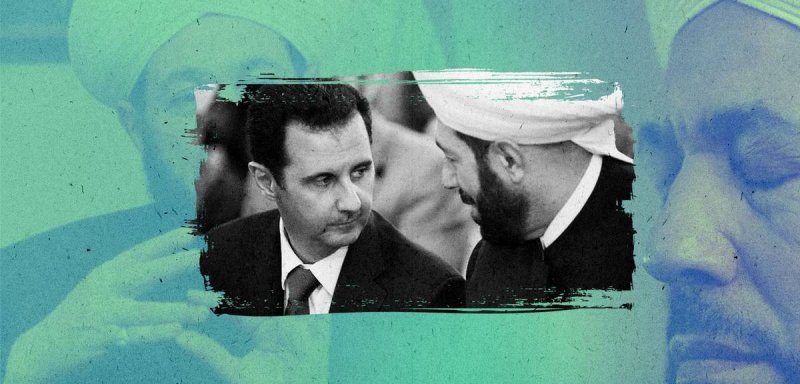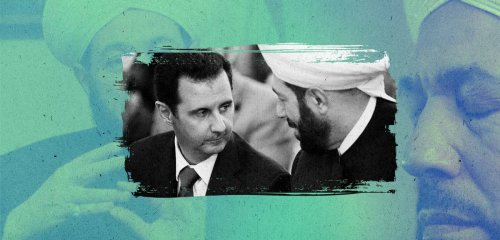As soon as Syrian President Bashar al-Assad issued a legislative decree amending Law No. 31 of 2018 - under which the “Scholarly Council of Jurisprudence” was formed within the Ministry of Awqaf (Religious Endowments) - a myriad of reactions soon followed.
Although the initial reaction to the decree was dominated by the mockery of the Grand Mufti of the Syria, Ahmad Badreddin Hassoun, many comments - including those from Arab and international media outlets - initially reported the news as the Grand Mufti having been relieved from his duties. However, the law issued did not even mention the Grand Mufti, but rather expanded the powers of the “Scholarly Council of Jurisprudence” in the Ministry of Religious Endowments and amended its tasks, which in turn led to the abolition of the position of the Grand Mufti of Syria.
Al-Assad’s decision came after the “Scholarly Council of Jurisprudence” had issued a statement criticizing Hassoun’s interpretation of the Holy Quran’s Surah At-Tin at the funeral of the late singer Sabah Fakhri. Hassoun deemed that what’s meant by the word “man” in the verse, “{We have indeed created man in the best of moulds}”, is only the ‘Syrian man’. He also linked the surah to refugees and saw that those who left the country would be punished by Allah.
Some also attributed the decision to ongoing disputes between the Ministry of Awqaf - specifically its Minister Mohammed Abdul Sattar al-Sayed - and Hassoun. However, this continuous dispute between the two men is nearly twenty years old, starting before the two men even took office, with some disputes taking place under the auspices of the security services, as was customary in Syria.
Syria is now without a position that issues Fatwas. This is seen by many as a change in identity, and a complete abolition of the Sunni authority on legal issues, endowment laws and personal status laws, to the benefit of other sects
Others saw that the reason was the extent of the financial corruption that Grand Mufti Hassoun was involved in, however his corruption has been a well-established fact since he was the Mufti of Aleppo.
For the first time since before its independence, Syria is now without a position that issues fatwas (religious decrees). This has been seen by many as a major change in the identity of Syria and a complete abolition of the reference and authority of the Sunni doctrine when it comes to fatwas, endowment laws and personal status laws, to the benefit of the rest of the sects and denominations. The decision has diminished the influence of the Sunni majority among the sects, and has entrusted the task of issuing fatwas to multiple sects and denominations, since the “Scholarly Council of Jurisprudence” - which was assigned the task of issuing fatwas - now includes Sunni clerics, Imamite Shi’ite clerics, Druze sheikhs al-aql, Alawi and Ismaili sheikhs, as well as Christian patriarchs.
The Syrian Islamic Council (SIC) issued a statement accusing “the sectarian gang that rules Syria today of committing the most serious crimes against Syria, its people, its identity and affiliation. Abolishing the position of the Grand Mufti is a service that benefits the Wali al-Faqih, and transforms Syria into a sectarian state that’s distant from Islam and Arabism.”
The statement mentioned that, “The position of issuing fatwas, since the beginning of the Islamic conquest of Syria at the start of the Rashidun (Rightly-Guided) Caliphate, has been an honoured, superior, and elevated symbol that expresses the identity and affiliation of its people.” It noted that no one “has dared to abolish it, and even those who colonized Syria could not touch this high position,” stressing at the same time that their “condemnation of this major crime has nothing to do with the dismissal of Ahmad Hassoun, [also known as] the ‘Mufti of Baramil’, the one who spills the blood of the Syrians, contributes to their displacement and attacks their religion.”
The official spokesman of the Syrian Islamic Council, Sheikh Muti’ al-Batin, announced in press statements that “the main purpose of the abolition of this position is to bring in foreign elements that are loyal to Iran and that follow the Wali al-Faqih project (agenda), and this is a step that is taking Syria down a path towards sectarianism, fragmentation and separation from its past.” He pointed out that the decree to form the Scholarly Council of Jurisprudence “gives the minister the right to let Syrians or other nationalities enter the council, and this allows Iranians to enter the institution,” which al-Batin saw as “a targeting of the Sunni constituent of the country”.
Speaking to Raseef22, the director of the Syrian Memory Association and Professor of Social Sciences, Abdul Rahman al-Hajj, considered that “what happened is that the mufti was stripped of his authority while keeping his position,” adding that “it is possible that an explicit statement on this matter will be issued at a later time, after the position of the Grand Mufti has become a superficial one with no working purpose following this decree.”
The decision is a consolidation of the Shi’ite presence in the religious sphere through seizing the sects' seats and influence in the council, which of course is an extension of their political influence, ensuring greater control over Syria.
For al-Hajj, this will entail several things, including, “First, a change in the predominant religious identity in the country, and transforming it into just another sect through the Scholarly Council, which includes all the sects and which will be the religious front of the state. Second, the consolidation of the Shi’ite presence in the religious sphere through seizing the seats of the sects and their influence in the council, which of course is an extension of their political influence, which means ensuring greater control over the religious sphere through the state’s religious institutions. And this will constitute the most dangerous next move, since the Scholarly Council - as shown within its duties - will control the role of religion in society, religion in the way the political establishment wants it to appear.”
Al-Hajj says, “The strategic plan for Iranian intervention in Syria in 2013, as mentioned by the slain General Ahmed Hamedani - stipulates that working on religious conversion (to Shi’ism) in the country is a key item, and its implementation was postponed - as he said - at the request of the Secretary-General of Hezbollah because it was not appropriate to be carried out in in light of the situation and the war, and it seems that the time has now come.
Al-Hajj continues, “Third, the decision will also lead to the fostering of sectarianism, as the decision to marginalize the Grand Mufti will lead to the establishment of an alternative Sunni reference or authority that represents the ‘Sunnis’. Perhaps the Syrian Islamic Council (SIC) will undertake this task, and this will also be very dangerous; since, as much as this will allow the Sunni majority to feel that its identity is protected symbolically, it can reinforce its transformation into a rival sect within a divided society. Fourth, it will lead to a loss of confidence in the religious establishment, which could create a black market for fatwas that reinforce the alienation of society from the state and create new and likely extremist religious patterns, especially if we take into account the massive destruction in Syria and the lack of hope on the horizon.”
The religious establishment in Syria has always been supportive of the rule of the Assad family since the coup of the late Syrian President Hafez al-Assad in 1970. At the time, Sheikh Ahmed Kuftaro, the Grand Mufti of Syria who was supported by the Ba’athists in 1963, led a campaign to bless the religious establishment of the coup. Throughout the 30-year rule of al-Assad senior, the relationship between the religious establishment and the regime kept strengthening, and this was able to attract Sheikh Muhammad Ramadan al-Bouti, who had a high and prestigious academic standing, in Syria and the Islamic world.
Things did not differ much with the arrival of current President Bashar al-Assad (junior) to power, with Ahmad Badreddin Hassoun, the Grand Mufti of Syria and the highest religious authority in the country, becoming one of the most controversial religious figures throughout his tenure, specifically with the beginning of the revolution in 2011.
Hassoun, an Aleppo local, was appointed Mufti of Aleppo in 2002. In 2005, months after the death of Syria’s Grand Mufti, Ahmed Kuftaro, al-Assad appointed Hassoun as Grand Mufti of the Republic to succeed him. And even before his appointment as Grand Mufti of Syria and before Sayyed became the Minister of Endowments, the disputes between the two men had been public and out in the 0pen.”
Hassoun had also made another problematic statement, saying: “I swear to God that President Hafez al-Assad died only owning a house in Qardaha … and Bashar al-Assad has nothing, and I speak out of closeness”.
Hassoun has previously shown up in notable situations in support of Assad. He once said, “To the countries of Europe and all the conspirators, in the event of an attack on Syria and Lebanon, all our sons will become martyrs in the lands of America, France and Britain. I say to all Europe that we will now prepare martyrs (fighters) for them, and to America, that if America bombed Syria, then an eye for an eye, a tooth for a tooth, and the initiator shall bear the brunt of blame.”
Hassoun had also made another problematic statement, in which he said, “I swear to you by God that President Hafez al-Assad died only owning a house in Qardaha. I dare everyone to prove to me that he has another house, and Bashar al-Assad has nothing, and I speak out of closeness [to them]”.
When Ahmad Hassoun’s son was killed, the opposition accused the regime of assassinating him, while the regime accused “terrorist groups” of the operation. During the funeral, Hassoun said, “Those who commit these acts do not target people, but rather target the nation and want Syria to kneel before the Zionists and America,” stressing that “they will not reach their goal and even if there is only one man left in Syria, he will not give up Palestine, he will not kneel before the enemies of the nation, he will not be a coward, and he will not kill the innocent.”
Raseef22 is a not for profit entity. Our focus is on quality journalism. Every contribution to the NasRaseef membership goes directly towards journalism production. We stand independent, not accepting corporate sponsorships, sponsored content or political funding.
Support our mission to keep Raseef22 available to all readers by clicking here!
Interested in writing with us? Check our pitch process here!




